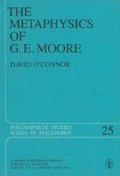Abstract
In the last chapter consideration was given to the philosophical background out of which Moore’s work emerged and in relation to which it must be viewed. We found Moore to have been critical of the British Empiricists in their perception of philosophy as mental science and, following an initial association with that school, of idealism too. Following that discussion we can now turn to consideration of a further dimension of Moore’s work, namely: the development of those positions in metaphysics which he himself would defend. In this chapter I will concentrate upon Moore’s use in philosophical matters of what he calls ‘common sense’. In subsequent chapters we will see how his analyses both of perceptual propositions and of propositions about abstract entities are connected to those defenses. For the present, however, our interest lies with the contribution made by those defenses themselves to what, in traditional terms, might be called philosophical problems about the external world. My consideration of Moore’s work in this chapter will consist of examination and appraisal of his arguments to prove1 the existence of an enduring world independent of experience, and to justify our ordinary supposition that we possess certain knowledge of the existence of such a world. On both scores Moore’s arguments reduce to his reliance upon common knowledge and belief.
Access this chapter
Tax calculation will be finalised at checkout
Purchases are for personal use only
Preview
Unable to display preview. Download preview PDF.
Notes
Moore, ‘Defence of Common Sense’, p. 53.
Russell, An Inquiry into Meaning and Truth (Penguin Books, Middlesex, 1967), p. 13.
W. H. Walsh, Metaphysics, p. 119.
See ‘Identity’, p. 103; also, ‘The Nature of Judgment’, p. 182.
“It seems to me that the business of metaphysics [including Russell’s own admitted business in those lectures] is to describe the world…”, Lecture III, ‘Atomic and Molecular Propositions’, Logic and Knowledge, (Allen and Unwin, London, 1971), p. 215.
Moore, Some Main Problems of Philosophy, p. 2.
Moore, Some Main Problems of Philosophy, p. 13.
Moore, ‘Autobiography’, p. 14.
Moore, Some Main Problems of Philosophy, p. 1; See Parmenides, 130, c-e, trans. F. M. Cornford, The Collected Dialogues of Plato, ed. by Edith Hamilton and Huntington Cairns (Princeton University Press, 1973), p. 924.
Moore, Some Main Problems of Philosophy, pp. 2, 3.
Moore, ‘Proof of an External World’, p. 130.
Moore, Some Main Problems of Philosophy, p. 16.
Ibid.
Moore, ‘Proof of an External World’, p. 146.
Moore, ‘Defence of Common Sense’, p. 34.
Moore, Some Main Problems of Philosophy, p. 113.
Moore, ‘Proof of an External World’, p. 146.
Ibid., pp. 96–101.
Moore, ‘Defence of Common Sense’, pp. 40–43.
Moore, Some Main Problems of Philosophy, p. 96.
Ibid., pp. 96–101, 135; also, ‘Hume’s Philosophy’, Philosophical Studies, p. 151.
Moore, ‘Defence of Common Sense’, p. 40.
Ibid; see ‘Some Judgments of Perception’ (1918), Philosophical Studies, p. 228 for the same point.
Moore, ‘Defence’, p. 42.
Ibid., p. 43.
Ibid.
‘Moore, “Do We Know that Material Things are Real?”’ (1928), Lectures on Philosophy, p. 48.
Ibid.
Moore, Some Main Problems of Philosophy, pp. 116–126.
Moore, Lectures on Philosophy, p. 44 and following.
Moore, Some Main Problems of Philosophy, p. 116.
Moore, ‘Proof of an External World’, p. 143.
Ibid., pp. 144–145; Also see Some Main Problems of Philosophy, p. 21.
In Moore’s formulation, the pencil- ‘material object in the external world’ connection works as follows: (1) I am holding a pencil which I know to exist, (2) pencils are material objects, (3) material objects are objects in the external world (by virtue of the meaning of the terms), (4) thus I am holding up an object in the external world which I know to exist. It is (3) which directly opposes the esse est percipi formula. Insofar as Moore’s definition in (3) is accepted, Berkeley’s account of the so-called external world is false. But is (3) true by virtue of the meaning of ‘material objects?’; that is, does (3) have to be true? Certainly Berkeley would deny it. Moore’s response to Berkeley, as we saw in the previous chapter is, in effect, one of incredulity. See Chapter II, Section 3; also, D. Locke, Perception and Our Knowledge of the External World (Allen and Unwin, London, 1967), pp. 129–131.
Moore, Some Main Problems of Philosophy, pp. 119–120.
Moore, ‘Proof of an External World’, p. 146.
D. Locke, Perception and Our Knowledge of the External World (Allen and Unwin, London, 1967) p. 146; also, Some Main Problems of Philosophy, p. 120 and Lectures on Philosophy, p. 44.
‘Hume’s Philosophy’, Philosophical Studies, p. 159; Some Main Problems of Philosophy, pp. 119–120; ‘Proof of an External World’, p. 148.
Moore, Some Main Problems of Philosophy, p. 122.
Ibid., p. 123.
Ibid.
Ibid., p.127.
Ibid., p. 123.
Moore, ‘Four Forms of Scepticism’, Philosophical Papers, p. 22.
Moore, Some Main Problems of Philosophy, p. 125. Also see Ibid, p. 143. and ‘Some Judgments of Perception’ (1918), Philosophical Studies, p. 228.
Relations between analysis and common sense will be further discussed in the next chapter.
Moore, ‘Proof of an External World’, p. 149.
See note 1 above.
Editor’s fn. 1, ‘Cerainty’, Philosophical Papers, p. 251.
Ibid., p. 250.
Author information
Authors and Affiliations
Rights and permissions
Copyright information
© 1982 D. Reidel Publishing Company, Dordrecht, Holland
About this chapter
Cite this chapter
O’Connor, D. (1982). Common Sense in Metaphysics. In: The Metaphysics of G. E. Moore. Philosophical Studies Series in Philosophy, vol 25. Springer, Dordrecht. https://doi.org/10.1007/978-94-009-7749-5_3
Download citation
DOI: https://doi.org/10.1007/978-94-009-7749-5_3
Publisher Name: Springer, Dordrecht
Print ISBN: 978-94-009-7751-8
Online ISBN: 978-94-009-7749-5
eBook Packages: Springer Book Archive

